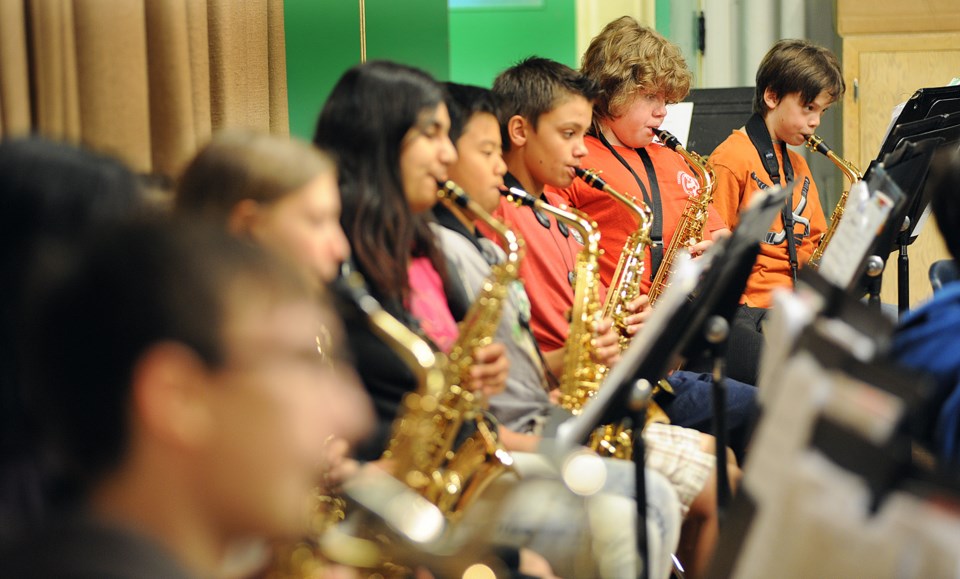Advocates of early education in music and collaboration are sounding alarms. They don’t want to see the itinerant band and strings program for elementary schools silenced by the Vancouver School Board.
Senior board staff have recommended either eliminating the program for a savings of $630,651 or increasing the annual program fee from $25 to $250 a year to generate $350,000 in the board’s preliminary 2014-2015 budget.
The equivalent of nearly nine music teachers instruct approximately 2,000 students by travelling between 52 elementary schools in Vancouver to teach band or strings, usually partially outside of the regular school timetable. It’s these music teacher positions that could be eliminated.
Proponents of band programs note learning an instrument aids brain development, physical endurance and discipline.
“It’s kind of learning a second language,” said Elka Yarlowe, president and CEO of the Access to Music Foundation.
Bandmates learn to communicate and collaborate. “Which is a very, very different experience than, say, studying privately,” Yarlowe said. “One of our big concerns is that this will create an enormous economic disparity, so parents in Shaughnessy can afford to have their kids study privately or put them into a regional ensemble or something like that and the kids whose parents can’t afford that will have nothing.”
Access to Music has provided $85,000 to needy Vancouver schools since 2007 to buy music instruments. The music teacher at Queen Alexandra elementary told Yarlowe a former student who copes with attention deficit hyperactivity disorder and fetal alcohol syndrome recently reported listening to and playing classical music helps him calm down, focus and function.
“And there are hundreds of kids like him,” she said.
The foundation launched an #investinVanKids Twitter campaign that has received support from Juno award-wining musical duo Tegan and Sara.
The Ministry of Education’s learning outcomes for elementary music education don’t require students to learn how to play musical instruments.
The VSB proposed eliminating the band and strings program in 2010, but instead introduced the annual $25 fee.
The Coalition for Music Education in B.C. notes the Richmond School District dealt with potential cuts to its itinerant elementary school band program by making band mandatory for Grades 6 and 7 students, taught by itinerant music specialists during their classroom teacher’s prep time.
Christin Reardon MacLellan, president of the non-profit coalition, said its members want “equal cuts across the board in every program and every bit of the VSB’s infrastructure, rather than preying on music programs.”
Access to Music Foundation provides an instrument repair fund, instrument rental bursaries and subsidies to parents who can’t afford fees. Yarlowe said students already drop out of music programs to avoid admitting their families can’t afford related costs.
The VSB has to deliver a balanced budget to the province. The board faces an estimated shortfall of $12.34 million for 2014-2015. The board’s operating budget is $497.19 million, and staff expect to spend approximately 92 per cent of this amount on salaries and benefits.
Yarlowe suggested the VSB should conserve money for band and strings by cutting the salaries for trustees and administrators.
Both Reardon MacLellan and Yarlowe are to speak to the preliminary budget April 15, after the Courier’s press deadline.
For more information, search for “preliminary budget” at vsb.bc.ca or see vsbdpac.ca.
Budget meetings and timelines:
- April 15 – The public responds to the preliminary budget, 7 p.m. at Mount Pleasant elementary at Guelph and East Seventh Avenue.
- April 16 – The public responds to the preliminary budget, 8 to 10 p.m., Room 114, school board office at 1580 West Broadway.
- April 17 – The public responds to the preliminary budget, 5:30 to 9 p.m., Room 114 at the school board office.
- April 22 – Revised budget goes before the VSB’s finance committee.
- April 28 – The board receives input on the revised budget.
- April 30 – The board finalizes the budget.
This story has been modified since it was first posted.



